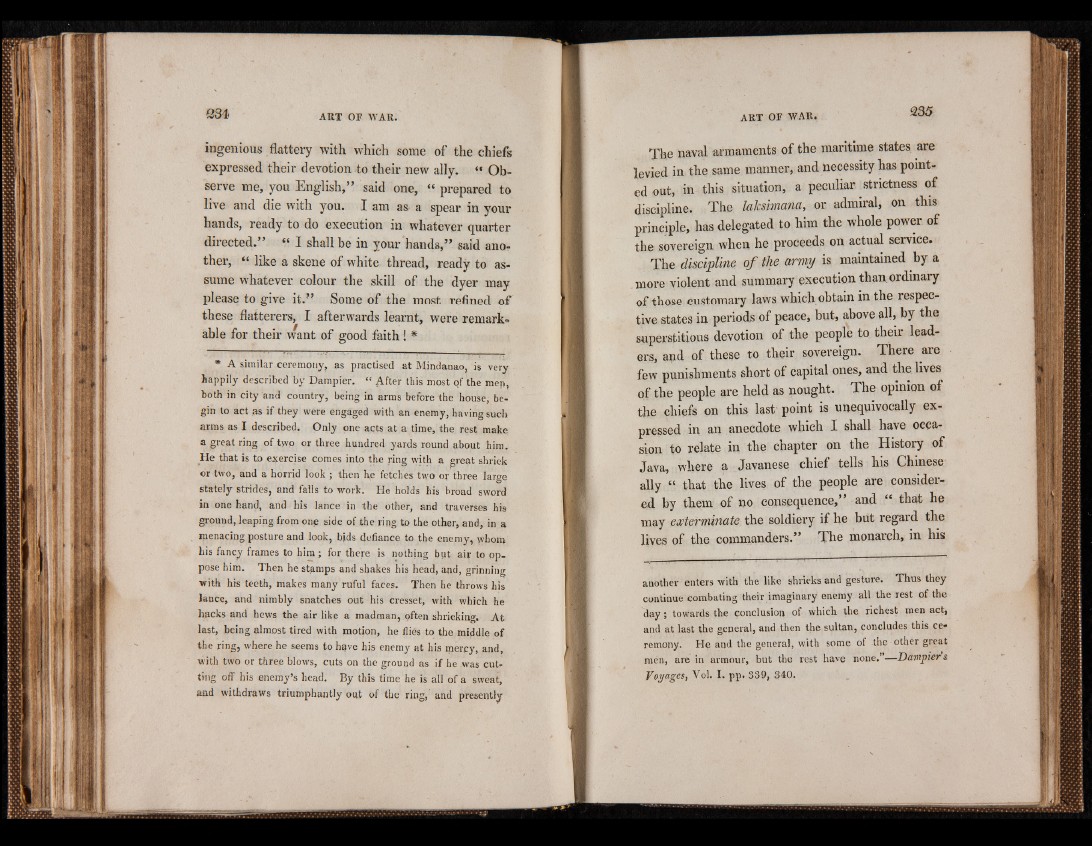
ingenious flattery with which some of the chiefs
expressed their devotion to their new ally. “ Observe
me, you English,” said one, “ prepared to
live and die with you. X am as- a spear in your
hands, ready to do execution in whatever quarter
directed.” “ I shall be in your hands,” said ano-
ther, “ like a skene of white thread, ready to assume
whatever colour the skill of the dyer may
please to give it.” Some of the most refined of
these flatterers, I afterwards learnt, were remarkable
for their want of good faith! *
* A similar ceremony, as practised at Mindanao, is very
happily described by Dampier. “ After this most of the men,
both in city and country, being in arms before the house, begin
to act as if they were engaged with an enemy, having such
arms as I described. Only one acts at a time, the rest make
a great ring of two or three hundred yards round about him.
He that is to exercise comes into the ring with a great shriek
or two, and a horrid look ; then he fetches two or three large
stately strides, and falls to work. He holds his broad sword
in one hand, and his lance in the other, and traverses his
ground, leaping from one side of the ring to the other, and, in a
menacing posture and look, bids defiance to the enemy, whom
his fancy frames to him ; for there is nothing but air to oppose
him. Then he stamps and shakes his head, and, grinning
with his teeth, makes many ruful faces. Then he throws his
lance, and nimbly snatches out his cresset, with which he
hacks and hews the air like a madman, often shrieking. At
last, being almost tired with motion, he flies to the middle of
the ring, where he seems to have his enemy at his mercy, and,
with two or three blows, cuts on the ground as if he was cutting
off his enemy’s head. By this time he is all of a sweat,
and withdraws triumphantly out of the ring, and presently
The n a v a l armaments of the maritime states are
levied in the same manner, and necessity has pointed
out, in this situation, a peculiar strictness of
discipline. The laksimana, or admiral, on this
principle, has delegated to him the whole power of
the sovereign when he proceeds on actual service.
The discipline o f the army is maintained by a
more violent and summary execution than ordinary
of those customary laws which obtain in the respective
states in periods of peace, but, above all, by the
superstitious devotion of the people to their leaders,
and of these to their sovereign. There are
few punishments short of capital ones, and the lives
of the people are held as nought. The opinion of
the chiefs on this last point is unequivocally expressed
in an anecdote which I shall have occasion
to relate in the chapter on the History of
Java, where a Javanese chief tells his Chinese
ally " that the lives of the people are considered
by them of no consequence,” and “ that he
may exterminate the soldiery if he but regard the
lives of the commanders.” The monarch, in his
another enters with the like shrieks and gesture. T h u s they
continue combating their imaginary enemy a ll th e rest of the
d a y ; towards the conclusion o f which the richest men act,
and at last the general, and then the sultan, concludes this c e remony.
H e and the general, w ith some o f the other great
men, are in armour, but the rest have none.”—Dampiers
Voyages, V o l. I . pp. 3 3 9 , 3 4 0 .